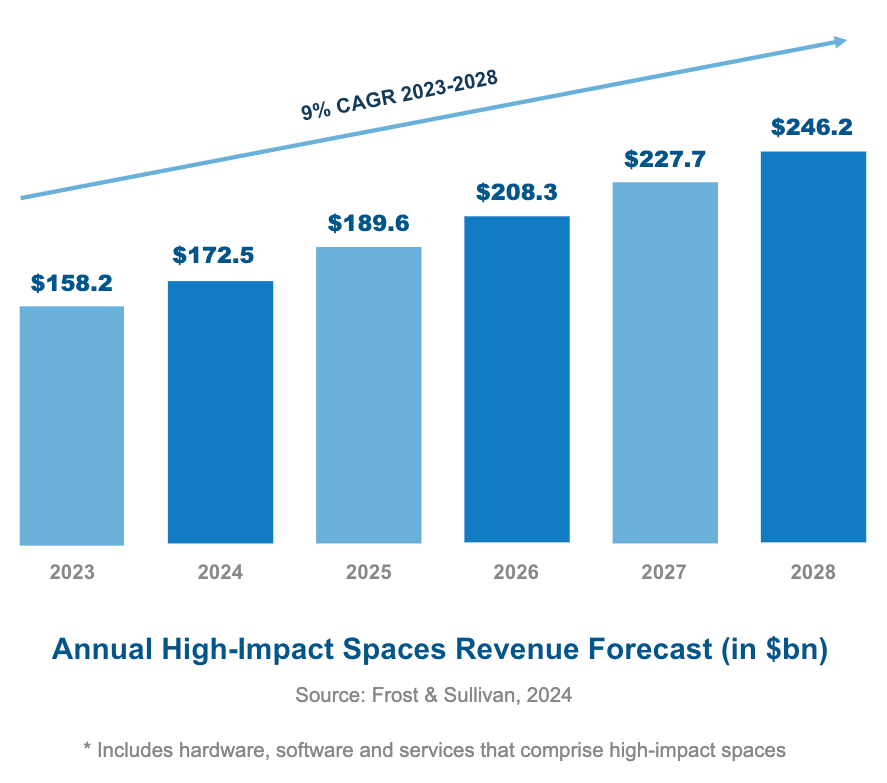Discover how high-impact spaces—tech-rich, flexible environments—are reshaping the modern hybrid office.
With a decisive shift toward hybrid work across the globe, company leaders have been strategically re-evaluating their real estate footprints since mid-2020. Organizations quickly learned that traditional meeting spaces, no matter the size, have limited abilities to provide truly equitable experiences in this age of remote team collaboration. As companies reconfigure or scale back their office portfolios, new resources are available for investment in “high-impact spaces”—the most tech-rich environments within the hybrid office realm.
Simply defined, high-impact spaces are the destinations within an office environment that are dynamic, scalable and capable of providing an immersive and engaging experience for everyone, both in-person and remote.
High-impact spaces look and function differently for every organization, but at their core, they are mission-critical, high-visibility spaces that typically integrate flexibility for different modes and purposes. These are the spaces where employees can once again gather for team-focused interactions, innovation hubs, company townhalls and customer summits as well as events and programs reinforcing company culture and team building.
Frost & Sullivan estimates that by 2028, the demands for the high-impact space market—including crucial software, hardware and integrative services—will reach nearly $250 billion with approximately 14.4 million high-impact spaces deployed in offices across the globe.

Designing with Space Outcomes at the Forefront
High-impact spaces play a pivotal role in workplace transformation and represent a paradigm shift in how organizations are conceptualizing the modern office. As such, workplace designers are finding new ways to bring these kinds of spaces to life to meet companies’ unique needs. Traditionally, organizations have characterized meeting spaces according to size or number of in-room participants, rather than their desired outcomes. By following a more activity-based design approach, dynamic high-impact spaces can emerge that serve employees better and more comprehensively.
Once a space’s use cases are determined, it’s advantageous to decide what technologies will need to be integrated to ensure that it functions properly and provides meaningful experiences for those in and out of the office. Furthermore, having such discussions in the early stages of a high-impact space project will lead to design decisions that seamlessly incorporate the defined technology requirements.
When designed with technological solutions in mind—from adaptability to AI—high-impact spaces thrive for their respective organizations. Accordingly, holistic high-impact space design is made possible by team members with a deep understanding of the technological components that will ensure a smooth experience. Better yet, leveraging an integrated platform can help with the heavy lifting for any team that is planning such spaces across a broad spectrum of technical knowledge.
Well-equipped high-impact spaces offer an array of benefits to all employees in addition to organizations at-large. At a base level, technologically rich high-impact spaces can offer a digital equivalent of the face-to-face experience within the context of meetings for employees joining remotely, providing crucial meeting equity for every employee. This natural, equitable experience has become a goal shared by employees on all levels, as today executives are just as likely to work remotely as their team members.

The influence of effective high-impact spaces is amplified as they facilitate a truly hybrid model and encourage precious in-office time for all employees. Such spaces have the power motivate co-workers to gather in the office more regularly, promoting the spontaneous collaboration, engagement and interaction that drive both company culture and professional growth within and, possibly more importantly, outside of set meeting times. For company leadership, the strategic integration of high-impact spaces, versus maintaining legacy rooms, allows them to:
- Refocus existing gathering spaces;
- Rebuild company culture through dynamic, memorable collaboration; and
- Catalyze employee self-fulfillment—the ultimate benefit of high-impact spaces—in support of both recruitment and retention.
In any case, when it comes to high-impact space design, the four most important components to consider are that it be integrated, flexible, automated and scalable within the context of its specific use for its organization.
Four Pillars of High-Impact Spaces
Integrated: Each high-impact space should be equipped with professional-grade AV and control platforms and integrated seamlessly with unified communications and collaboration platforms like Microsoft Teams, Zoom and Google Meet. Additional functionalities often include multi-zone audio, video distribution and multiple camera integration.
Flexible: By implementing a truly flexible, singular platform in high-impact spaces throughout an office, a variety of engagements can be served across diverse rooms with unique and complex activity-based needs. Optimal flexibility is achieved through software-based AV and control solutions that allow the development of new, sophisticated use cases to future-proof high-impact space investment.

Automated: Each space should offer a repeatable, effortless and elevated collaboration experience, minimizing the need for constant IT and AV support, including remote management capabilities. An automated experience provides security in its consistency for participants, helping to remove any anxieties about dealing with technology so that employees can focus on the task or conversation at-hand. These features of high-impact spaces—particularly full room control based on visual and audible actions in the room, such as presenter tracking, lighting/display control and automatic multi-camera switching—help to ensure everyone has an equally connected seat for in-office participation, remove friction for human interaction from hybrid meetings and help on-site employees to include remote participants just as easily as those seated next to them in the meeting room.
Scalable – High-impact spaces should always be equipped at scale with software-based audio, video and control solutions in order to grow with companies instead of stunting them. Room standardizations can assist with this scalability as well, helping IT teams to create an easily repeatable experience.
Customizability through Software-Based Solutions
High-impact spaces can achieve their highest impact within a singular ecosystem that is easy to deploy, manage, augment, upgrade and scale. For example, the Q-SYS Platform allows organizations to fully customize their high-impact spaces to their specific needs, leveraging an established Partner Ecosystem that empowers them to create spaces beyond the boundaries of a typical meeting room.
A leading tech real estate marketplace company recently realized the benefits of this forward-thinking approach to work in a rollout of high-impact spaces throughout their office portfolio. The company prioritized integrated AV solutions as one of the first companies to implement a “work from anywhere” policy on an indefinite basis. Q-SYS worked with the company to develop more than a dozen tailored spaces across their office portfolio equipped with Q-SYS and simplified control. Q-SYS is now supporting their varied environments ranging from video conferencing rooms to interactive classrooms. As part of the Q-SYS OS, the Q-SYS Reflect robust cloud monitoring and management capabilities allowed the company’s IT team to remotely deploy any changes, upgrades or new features. As such, unique customizations that adapt to the company’s workflow can be rolled out widely while maintaining a friendly and consistent user experience throughout each high-impact space.

High-impact spaces have the power to level the playing field in the hybrid realm, giving everyone access to sophisticated meetings in support of a desirable work environment and culture. While organizational growth and success remain primary goals for company leadership teams, ultimately, high-impact spaces are about satisfying end-user preferences—how they want to project themselves, no matter where they want to work.
This article was published in partnership with Q-SYS.

